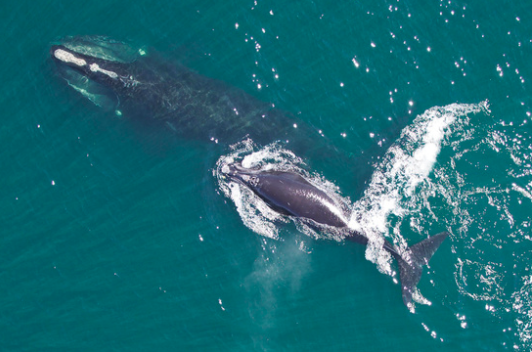
North Atlantic Right Whale Mother and Calf Photo: NOAA
A joint U.S.-Canada scientific paper published yesterday in the journal Diseases of Aquatic Organisms looked at the causes of death for 70 North Atlantic right whales within the 16-year time period between 2003 and 2018 and found that of the 43 for which the researchers could determine a cause of death, nearly 90% were a direct result of entanglement in fishing lines and vessel collisions. Significantly, the scientists also deduced that none of the adult or juvenile North Atlantic right whale deaths were a result of natural causes and thus they are dying prematurely as the result of human activities.
Why This Matters: There are only 411 North Atlantic Right Whales remaining and both the governments of Canada and the U.S. are struggling to keep the recent death toll down. As terrible as it is to learn that humans are overwhelmingly the cause of this recent spate of deaths, it is also a recognition that they are preventable. Diagnosing the causes of death is critical to creating focused management actions that can reverse what is happening to this critically endangered species of whale. Just like the west coast’s critically endangered population of orcas in Puget Sound, extraordinary measures are needed to ensure they don’t go extinct on our watch.
Entanglements are Traumatic. The research was led by Dr. Sarah Sharp, a veterinarian with the International Fund for Animal Welfare (IFAW) who worked with a multi-agency team of veterinarians, biologists, and pathologists. Entanglement caused immediate, traumatic drowning events in some cases and prolonged, painful deaths in others as a result of constrictive wraps of line.
- Additional review of studies dating back to 1970 showed that entanglement deaths increased from 21% to 51%, despite mitigation efforts.
- Wrapping around the whale’s flippers, tail, head, or mouth, fishing line was responsible for deep lacerations, and even partial amputations of the flippers, often leading to emaciation resulting from an inability to feed properly.
- Sharp concluded that “With a population this small and with birth rates declining precipitously, the loss of even one individual represents a major blow to the recovery of the species as a whole. The data tell a very compelling story, one which we can still turn around to bring the species back from the brink of extinction.”
The Scientists Also Offered Recommendations.
- Employing more effective gear modifications including ropeless fishing in both the US and Canada to minimize the chance of right whales encountering line in the ocean;
- Expanding vessel speed restrictions to include larger swaths of North Atlantic right whale habitat;
- Implementing dynamic management strategies (such as fisheries closures and mandatory speed restrictions) when right whales are seen in certain areas, which is especially important as right whale habitat use has become more unpredictable in recent years;
- Implementing coordinated gear marking to better monitor where and when whales get entangled and guide mitigation strategies; and
- Supporting continued and expanded efforts to survey offshore habitats for North Atlantic right whale carcasses to obtain more accurate mortality statistics and necropsy efforts to determine the cause of death.
June 20, 2019 » entanglement, extinction, fishing, North Atlantic Right Whale, ship strikes


